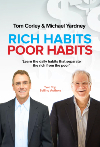There is a classic book by Napoleon Hill called Think and Grow Rich. While it was written almost 100 years ago, you will find it on the bookshelf of almost every successful investor. There is a good reason why the book is called Think and Grow Rich and not Get a Job, Work Hard and Grow Rich. It’s because the rich think differently to most people, and those who work hard at a job don’t necessarily end up rich.
It’s important to remember that your thoughts lead to your feelings; your feelings lead to your actions; and your actions lead to your results. In other words, your inside world (your thoughts and feelings) directly affect your outside world (your actions and your habits, which lead to the results you achieve).
39 ways the rich think differently
I’m going to outline 39 ways the rich think differently to the average person, because this is what determines their Rich Habits — this is what makes them act differently to most people. Here’s a summary of some of the many ways the rich think differently:
| Number | The Average person | The Rich |
|---|---|---|
| 1 | Thinks about spending their money | Think about how to invest their money |
| 2 | Worries about running out of money | Think about how to use their money to make more money |
| 3 | Believes hard work makes you rich | Believe leverage creates wealth |
| 4 | Believes having a job gives them security | Know there’s no such thing as job security |
| 5 | Believes in working for money | Believe in working for fulfilment |
| 6 | Want to be rich | Are committed to being rich |
| 7 | Sets their financial expectation low, so they’re never disappointed | Set their financial expectations high so they’re always excited |
| 8 | Focuses on obstacles in their way | Focus on the opportunities all around them |
| 9 | Believes life happens to them — they are a passenger | Believe that they create their own destiny — they are the pilot of their lives |
| 10 | Believes money will make them happier | Know that money has little to do with happiness, but it does make your life easier and more enjoyable |
| 11 | Believes they aren’t worthy of wealth | Believe they deserve to be rich |
| 12 | Believes rich people are lucky | Know luck has nothing to do with it |
| 13 | Resents successful and rich people | Admire other rich and successful people |
| 14 | Thinks about money emotionally | Think about money logically |
| 15 | Believes it’s wrong for a small group of people (the 1%) to possess most of the money | Welcome the masses (the 99%) to join them |
| 16 | Believes rich people are dishonest | Believe rich people are ambitious |
| 17 | Believes money is the root of all evil | Believe poverty is the root of all evil |
| 18 | Believes money changes people | Believe money reveals people |
| 19 | Believes if they become wealthy they will lose their friends | Believe being wealthy will expand their network |
| 20 | Believes they can’t afford to give to charity | Believe they must be generous |
| 21 | Thinks either/or | Know they can have both |
| 22 | Believes they must choose between a great family life and being poor, or love and being poor | Know they can have it all — it’s not either/or |
| 23 | Sees money as a finite resource | See money as an infinite resource |
| 24 | Dreams of having enough money to retire | Dream of having enough money to leave a legacy |
| 25 | Thinks small | Think big |
| 26 | Believes they have to build wealth on their own | Know that if they’re the smartest person in their team, they’re in trouble |
| 27 | Believes their thinking is unrelated to their net worth | Know their mindset is critical to their results |
| 28 | Believes you have to be educated and smart to be rich | Know intelligence has little to do with getting rich |
| 29 | Believes you have to have money to make money | Know you can use other people’s money to become rich |
| 30 | Believes the rich should support the poor | Believe in self-reliance |
| 31 | Teaches their children about money by example | Interestingly the rich do the same thing |
| 32 | Hands down their limiting beliefs about money to their children | Hand down their empowering beliefs about money to their children |
| 33 | Teaches their children how to survive | Teach their children how to become wealthy |
| 34 | Minimises the importance of money to their children | Teach their children the importance of money |
| 35 | Teaches their children to be happy with what they have | Teach their children to follow their dreams and aim for the stars |
| 36 | Don’t believe in personal development | Know that their personal wealth can’t grow faster than their personal growth |
| 37 | Thinks education finishes when you leave school and would rather be entertained than educated | Continually learn and grow |
| 38 | Thinks short term | Think long term |
| 39 | Feels threatened by change | Embrace change |
Source: Rich Habits Poor Habits

Where do you fit in?
How often did you find yourself on the left-hand side of this table and how can you get to be more like the people on the right? And, just as importantly, how does this affect your habits and behaviours? At my seminars, I often ask what the attendees were taught about money when they were young and the list usually looks something like this:
- Money doesn’t grow on trees
- Filthy rich, dirty money
- We don’t deserve to be rich
- You can’t have money and be spiritual
- Rich people are greedy
- You have to work hard to be rich
- You shouldn’t talk about money or show of your wealth
Remember, we were told these things as children when we didn’t have the perspective to decide whether they were right or wrong. But many of us have carried these myths into adulthood.
Why not look at the list of the 39 ways of thinking in the table and see which ones strike a chord with you? Of course, you can add any I’ve missed that relate to you. Then work out why you hold on to these beliefs. Do they still make sense?
Now is the time to get rid of any that you can question or that you think are nonsense. Now is the time to discard any that simply aren’t true, that may be holding you back, and are stopping you from becoming rich.
More importantly, now is the time to replace them with some new empowering beliefs. Why not write down a new list:
- I deserve to be wealthy
- It’s okay for me to be rich
- I’m going to be wealthy
In fact, choose as many, if not all, of the beliefs on the right-hand side of the previous table and make them your new money beliefs.
Does money buy happiness?
Here’s a money belief you may want to reconsider … money doesn’t buy happiness.
My co-author, Tom, spent five years studying the daily habits of the rich and poor and he found that:
- 82% of the wealthy were happy, while 98% of the poor were unhappy
- 87% of the wealthy were happy in their marriage, while 53% of the poor were unhappy
- 93% of the wealthy were happy because they liked or loved what they did for a living, while 85% of the poor were unhappy
- 0% of the wealthy were unhappy due to finances, while 98% of the poor were unhappy
Tom also found that money problems can have a ripple effect on your life. They can result in an overall sense of unhappiness, and they can create marital stress, making both spouses unhappy in the marriage. Even worse, that stress can cause health issues and, worse still, it can negatively impact the lives of your children.
On the other hand, Tom found being rich can create an overall sense of happiness, may improve marital relationships, may eliminate stress associated with money problems – which can improve your overall health – and can enable parents to give their kids a superior education.
Being rich can increase happiness in many areas of your life. Tom’s research found that wealth and poverty can potentially have a domino effect on all aspects of your life, so if you improve your financial condition in life, you may increase happiness in other aspects of your life.
To have more, you must become more
I remember one of my early mentors, Jim Rohn, saying: “If you don’t like how things are, change it. You’re not a tree.”
He also said that becoming wealthy begins with an attitude of gratitude. That’s why I want you to take inventory of all the great wealth you already have.
Go ahead and ask yourself, “What do I feel grateful for in my life?” Take a couple of minutes to write it down.
Now, if you were to show that list to most people around the world they would probably call you wealthy. You see, wealth is a matter of context and perspective that ultimately creates a feeling. Feel grateful for all you have, and you are likely to feel instantly wealthy.
Those who believe they can become rich and are worthy of wealth are the ones who will be, because they act accordingly. People who become rich consistently take the necessary actions that turn their beliefs into realities.
That’s why I now want you to decide that you are worthy of becoming rich. It will be your first step toward greater prosperity. After all, people with difficulties, obstacles and limitations have gone on to become incredibly wealthy — so why not you?
If you think you can, you will. Your attitude will determine your destiny.

This is an edited extract from Rich Habits Poor Habits by Michael Yardney and Tom Corley (Wilkinson Publishing, $35.38) republished with permission.
Enjoy reading this article?
Sign up to receive more news like this straight to your inbox.
By subscribing you agree to the Canstar Privacy Policy




Share this article